 Support for Drupal 7 is ending on 5 January 2025—it’s time to migrate to Drupal 10! Learn about the many benefits of Drupal 10 and find migration tools in our resource center.
Support for Drupal 7 is ending on 5 January 2025—it’s time to migrate to Drupal 10! Learn about the many benefits of Drupal 10 and find migration tools in our resource center.Drupal Community Module Evaluation: A Go-to Guide

It's not only about what a module from the Drupal community can achieve when you consider using it. Along with how long you want your website to remain, you need also to consider who will maintain it after it goes up. These factors influence the level of danger you are willing to accept.
For instance, you might desire modules with an excellent track record and robust community support if you're not too familiar with Drupal.
Every module available on Drupal.org is licensed under the GPLv2 and is open source. This means that while they are free to use, any dangers are your responsibility but every module has a community of users who assist with problems and updates, as well as a team of maintainers for each module. Additionally, partnering with a reputable Drupal web development company can provide further assurance in terms of module selection, ongoing support, and maintenance.
Let's discuss some factors to consider when evaluating a community module.
Drupal is Alive and Well in India: Tim Doyle
Running Nightwatch tests in Acquia Code Studio

Nightwatch is an automated testing framework for web applications and websites. It uses the W3C WebDriver API to simulate real user interactions in a web browser environment, such as Chrome, to test the complete flow of an application, end-to-end.
In this tutorial, we'll see how we can extend the Acquia AutoDevOps template that comes out-of-the-box with Code Studio to also run Nightwatch tests for our application so we can ensure critical features remain functional as we further develop and maintain it.
- A simple Nightwatch test
To start, let's first add a simple Nightwatch test to verify Drupal is up and running by navigating to the Drupal login page and
EvolveDrupal Guide
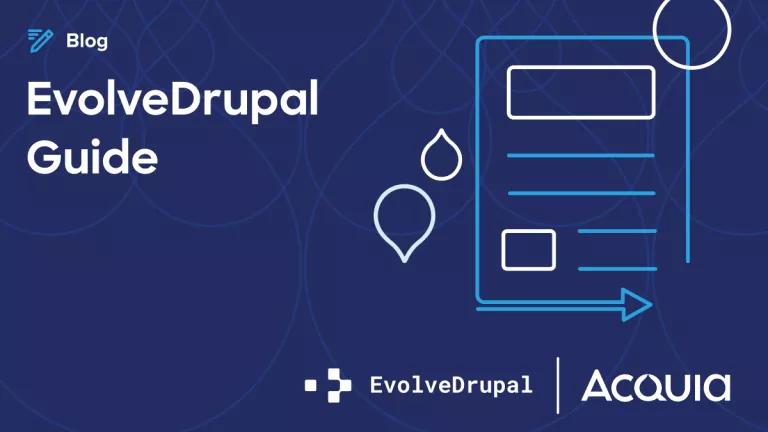 About the Host, Evolving Web
About the Host, Evolving Web
Evolving Web is the agency partner that empowers organizations to adapt to the ever-changing digital landscape. We’re a team of 90+ technologists, storytellers and creatives who believe that a dynamic and adaptable digital presence is the most powerful way for clients to create meaningful connections. Through strategy, technology, design, marketing, and training, we set stories in motion through digital platforms designed for growth.
Evolving Web was founded in 2007 by two passionate Drupalists on the ideals that define the open source ethos: transparency, collaboration, and continuous improvement. Then and now, we believe in the power of open source to drive innovation and growth. Our team regularly contributes to the open source community through code, documentation, sponsorship, strategic initiatives, and events like EvolveDrupal.
Getting Started with Acquia Cloud IDE: A Code Editor as a Service
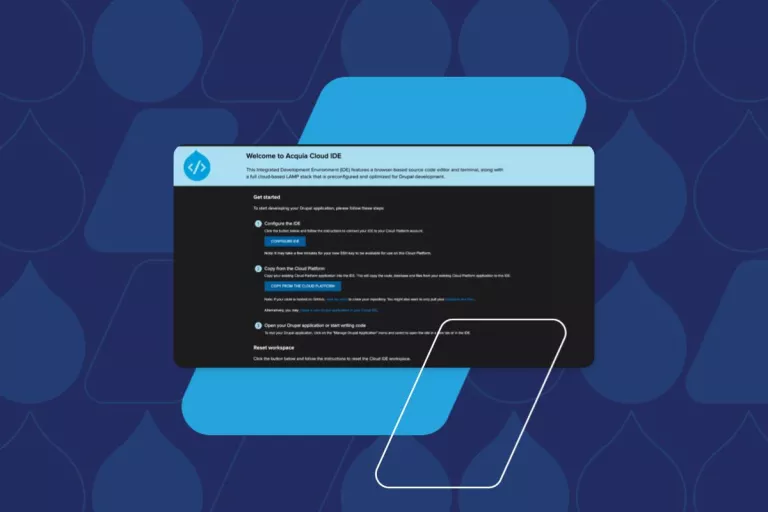
There are two main challenges developers face when setting up and managing their local environments:
- Lack of local resources (You need a powerful machine to run Docker.)
- Lots of time spent configuring environments, especially if you want to build something more sophisticated
While it may be fun experimenting with Linux and everything related to DevOps, sometimes you just don’t have the time. Sound familiar?
Don’t take my word for it. Check out this Twitter poll conducted by a former colleague:
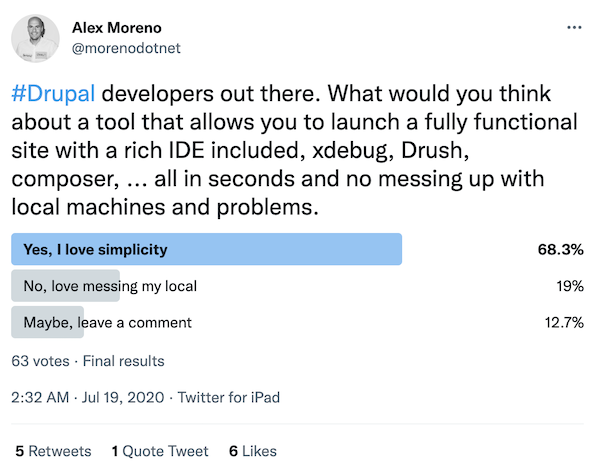
The results could not be more clear. Developers want simplicity. Fair, right? You have enough stress and problems to solve as you work to meet tight deadlines.
Lullabot Podcast: Ease of Updates, Compounded Peace of Mind
We look into the challenges and solutions in managing Drupal and other website updates across hundreds of websites, a topic brought to life by members of Lullabot's Support and Maintenance team and Jenna Tollerson from the State of Georgia.
Learn how Lullabot deals with update processes, drastically reducing manual labor while enhancing security and efficiency through automation.
"It's almost like adding another whole developer to your team!"
Building my own temperature and humidity monitor
Last fall, we toured the Champagne region in France, famous for its sparkling wines. We explored the ancient, underground cellars where Champagne undergoes its magical transformation from grape juice to sparkling wine. These cellars, often 30 meters deep and kilometers long, maintain a constant temperature of around 10-12°C, providing the perfect conditions for aging and storing Champagne.
 25 meters underground in a champagne tunnel, which often stretches for miles/kilometers.
25 meters underground in a champagne tunnel, which often stretches for miles/kilometers.
After sampling various Champagnes, we returned home with eight cases to store in our home's basement. However, unlike those deep cellars, our basement is just a few meters deep, prompting a simple question that sent me down a rabbit hole: how does our basement's temperature compare?
Rather than just buying a thermometer, I decided to build my own "temperature monitoring system" using open hardware and custom-built software. After all, who needs a simple solution when you can spend evenings tinkering with hardware, sensors, wires and writing your own software? Sometimes, more is more!
The basic idea is this: track the temperature and humidity of our basement every 15 minutes and send this information to a web service. This web service analyzes the data and alerts us if our basement becomes too cold or warm.
I launched this monitoring system around Christmas last year, so it's been running for nearly three months now. You can view the live temperature and historical data trends at https://dri.es/sensors. Yes, publishing our basement's temperature online is a bit quirky, but it's all in good fun.
Drupal adventures in Japan and Australia
Next week, I'm traveling to Japan and Australia. I've been to both countries before and can't wait to return – they're among my favorite places in the world.
My goal is to connect with the local Drupal community in each country, discussing the future of Drupal, learning from each other, and collaborating.
I'll also be connecting with Acquia's customers and partners in both countries, sharing our vision, strategy and product roadmap. As part of that, I look forward to spending some time with the Acquia teams as well – about 20 employees in Japan and 35 in Australia.
I'll present at a Drupal event in Tokyo the evening of March 14th at Yahoo! Japan.
While in Australia, I'll be attending Drupal South, held at the Sydney Masonic Centre from March 20-22. I'm excited to deliver the opening keynote on the morning of March 20th, where I'll delve into Drupal's past, present, and future.
I look forward to being back in Australia and Japan, reconnecting with old friends and the local communities.
Two years later: is my Web3 website still standing?

Two years ago, I launched a simple Web3 website using IPFS (InterPlanetary File System) and ENS (Ethereum Name Service). Back then, Web3 tools were getting a lot of media attention and I wanted to try it out.
Since I set up my Web3 website two years ago, I basically forgot about it. I didn't update it or pay attention to it for two years. But now that we hit the two-year mark, I'm curious: is my Web3 website still online?
At that time, I also stated that Web3 was not fit for hosting modern web applications, except for a small niche: static sites requiring high resilience and infrequent content updates.
I was also curious to explore the evolution of Web3 technologies to see if they became more applicable for website hosting.
My original Web3 experiment
In my original blog post, I documented the process of setting up what could be called the "Hello World" of Web3 hosting. I stored an HTML file on IPFS, ensured its availability using "pinning services", and made it accessible using an ENS domain.
For those with a basic understanding of Web3, here is a summary of the steps I took to launch my first Web3 website two years ago:
Acquia a Leader in the 2024 Gartner Magic Quadrant for Digital Experience Platforms
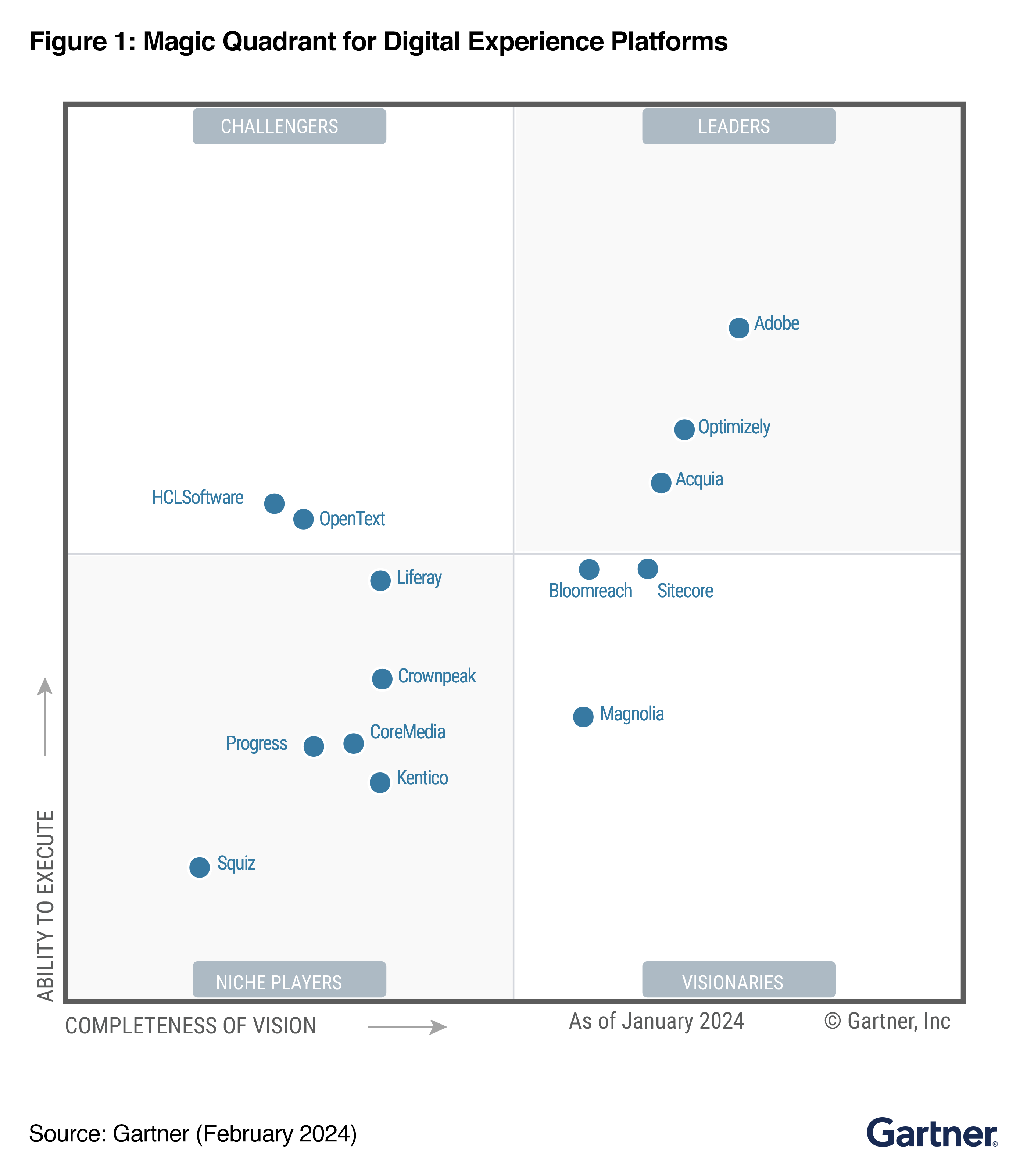
For the fifth year in a row, Acquia has been named a Leader in the Gartner Magic Quadrant for Digital Experience Platforms (DXP).
Acquia received this recognition from Gartner based on both the completeness of product vision and ability to execute.
Central to our vision and execution is a deep commitment to openness. Leveraging Drupal, Mautic and open APIs, we've built the most open DXP, empowering customers and partners to tailor our platform to their needs.
Our emphasis on openness extends to ensuring our solutions are accessible and inclusive, making them available to everyone. We also prioritize building trust through data security and compliance, integral to our philosophy of openness.
We're proud to be included in this report and thank our customers and partners for their support and collaboration.
Mandatory disclaimer from Gartner
Gartner, Magic Quadrant for Digital Experience Platforms, Irina Guseva, Jim Murphy, Mike Lowndes, John Field - February 21, 2024.
This graphic was published by Gartner, Inc. as part of a larger research document and should be evaluated in the context of the entire document. The Gartner document is available upon request from Acquia.
Satoshi Nakamoto's Drupal adventure
Martti Malmi, an early contributor to the Bitcoin project, recently shared a fascinating piece of internet history: an archive of private emails between himself and Satoshi Nakamoto, Bitcoin's mysterious founder.
The identity of Satoshi Nakamoto remains one of the biggest mysteries in the technology world. Despite extensive investigations, speculative reports, and numerous claims over the years, the true identity of Bitcoin's creator(s) is still unknown.
Martti Malmi released these private conversations in reaction to a court case focused on the true identity of Satoshi Nakamoto and the legal entitlements to the Bitcoin brand and technology.
The emails provide some interesting details into Bitcoin's early days, and might also provide some new clues about Satoshi's identity.
Satoshi and Martti worked together on a variety of different things, including the relaunch of the Bitcoin website. Their goal was to broaden public understanding and awareness of Bitcoin.
And to my surprise, the emails reveal they chose Drupal as their preferred CMS! (Thanks to Jeremy Andrews for making me aware.)
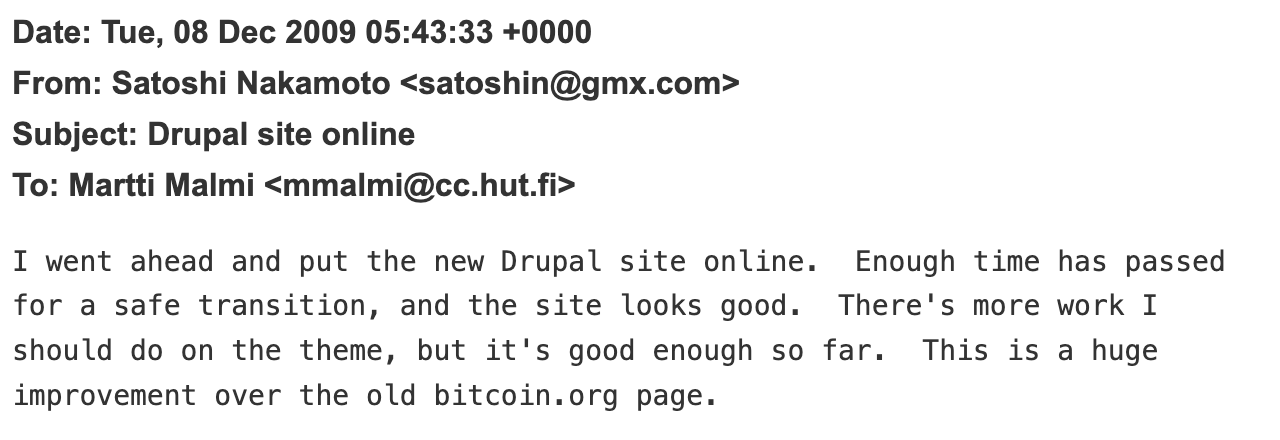
The emails detail Satoshi's hands-on involvement, from installing Drupal themes, to configuring Drupal's .htaccess file, to exploring Drupal's multilingual capabilities.
The little HTTP Header Analyzer that could
HTTP headers play a crucial part in making your website fast and secure. For that reason, I often inspect HTTP headers to troubleshoot caching problems or review security settings.
The complexity of the HTTP standard and the challenge to remember all the best practices led me to develop an HTTP Header Analyzer four years ago.
It is pretty simple: enter a URL, and the tool will analyze the headers sent by your webserver, CMS or web application. It then explains these headers, offers a score, and suggests possible improvements.
For a demonstration, click https://dri.es/headers?url=https://www.reddit.com. As the URL suggests, it will analyze the HTTP headers of Reddit.com.
I began this as a weekend project in the early days of COVID, seeing it as just another addition to my toolkit. At the time, I simply added it to my projects page but never announced or mentioned it on my blog.
So why write about it now? Because I happened to check my log files and, lo and behold, the little scanner that could clocked in more than 5 million scans, averaging over 3,500 scans a day.
So four years and five million scans later, I'm finally announcing it to the world!
If you haven't tried my HTTP header analyzer, check it out. It's free, easy to use, requires no sign-up, and is built to help improve your website's performance and security.
The crawler works with all websites, but naturally, I added some special checks for Drupal sites.
Acquia retrospective 2023
At the beginning of every year, I publish a retrospective that looks back at the previous year at Acquia. I also discuss the changing dynamics in our industry, focusing on Content Management Systems (CMS) and Digital Experience Platforms (DXP).
If you'd like, you can read all of my retrospectives for the past 15 years: 2022, 2021, 2020, 2019, 2018, 2017, 2016, 2015, 2014, 2013, 2012, 2011, 2010, 2009.
Resilience and growth amid market turbulence
At the beginning of 2023, interest rates were 4.5%. Technology companies, investors, and PE firms were optimistic, anticipating modest growth. However, as inflation persisted and central banks raised rates more than expected, this optimism dwindled.
The first quarter also saw a regional bank crisis, notably the fall of Silicon Valley Bank, which many tech firms, including Acquia, relied on. Following these events, the market's pace slowed, and the early optimism shifted to a more cautious outlook.
The Watchmaker's Approach to Web Development

Since 1999, I've been consistently working on this website, making it one of my longest-standing projects. Even after all these years, the satisfaction of working on my website remains strong. Remarkable, indeed.
During rare moments of calm — be it a slow holiday afternoon, a long flight home, or the early morning stillness — I'm often drawn to tinkering with my website.
When working on my website, I often make small tweaks and improvements. Much like a watchmaker meticulously fine-tuning the gears of an antique clock, I pay close attention to details.
This holiday, I improved the lazy loading of images in my blog posts, leading to a perfect Lighthouse score. A perfect score isn't necessary, but it shows the effort and care I put into my website.
Effortless inspecting of Drupal database queries
Drupal's database abstraction layer is great for at least two reasons. First, it ensures compatibility with various database systems like MySQL, MariaDB, PostgreSQL and SQLite. Second, it improves security by preventing SQL injection attacks.
My main concern with using any database abstraction layer is the seemingly reduced control over the final SQL query. I like to see and understand the final query.
To inspect and debug database queries, I like to use MariaDB's General Query Log. When enabled, this feature captures every query directly in a text file.
I like this approach for a few reasons:
- It directly captures the query in MariaDB instead of Drupal. This provides the most accurate view of the final SQL queries.
- It enables real-time monitoring of all queries in a separate terminal window, removing the need to insert debug statements into code.
- It records both successful and unsuccessful queries, making it a handy tool for debugging purposes.
If you're interested in trying it out, here is how I set up and use MariaDB's General Query Log.
First, log in as the MySQL super user. Since I'm using DDEV for my development, the command to do that looks like this:
[code bash]$ ddev mysql -u root -proot[/code]After logging in as the MySQL super user, you need to set a few global variables:
[code shell]SET global general_log = 1; SET global log_output = 'file'; SET global general_log_file = '/home/dries/queries.txt';[/code]This will start logging all queries to a file named 'queries.txt' in my home directory.
DDEV employs containers, isolated environments designed for operating specific software such as databases. To view the queries, you must log into the database container.
[code bash]$ ddev ssh -s db[/code]Now, you can easily monitor the queries in real-time from a separate terminal window:
The new old: Jamstack and MACH's journey towards traditional CMS concepts

In recent years, new architectures like MACH and Jamstack have emerged in the world of Content Management Systems (CMS) and Digital Experience Platforms (DXP).
In some way, they have challenged traditional models. As a result, people sometimes ask for my take on MACH and Jamstack. I've mostly refrained from sharing my perspective to avoid controversy.
However, recognizing the value of diverse viewpoints, I've decided to share some of my thoughts. I hope it contributes positively to the ongoing evolution of these technologies.
The Jamstack is embracing its inner CMS
Jamstack, born in 2015, began as an approach for building static sites. The term Jamstack stands for JavaScript, APIs and Markup. Jamstack is an architectural approach that decouples the web experience layer from content and business logic. The web experience layer is often pre-rendered as static pages (markup), served via a Content Delivery Network (CDN).
By 2023, the Jamstack community underwent a considerable transformation. It evolved significantly from its roots, increasingly integrating traditional CMS features, such as "content previews". This shift is driven by the need to handle more complex websites and to make the Jamstack more user-friendly for marketers, moving beyond its developer-centric origins.
Beware the ides of March!
With just one week until we meet in person for MidCamp 2024, book your ticket before the standard discount pricing ends on March 14, 11.59pm CT to save $100!
Session ScheduleWe’ve got a great line-up this year! All sessions on Wednesday and Thursday (March 20/21) are included in the price of your MidCamp registration. We encourage you to start planning your days -- and get ready for some great learning opportunities!
Expanded Learning TicketsKnow any students or individuals seeking to expand their Drupal knowledge?
We have heavily discounted tickets ($25!) available for students and those wanting to learn more about Drupal to join us at MidCamp and learn more about the community!
There are sessions for everyone—topics range from Site Building and DevOps to Project Management and Design.
Volunteer for some exclusive swag!If you know you'll be joining us in Chicago, why not volunteer some of your spare time and get some exclusive swag in return! Check out our non-code opportunities to get involved.
Zoocha: The Drupal Development Specialists in the UK
This article delves into Zoocha's strategies for engaging talent, promoting Drupal among younger audiences, and its ambitious goal to achieve carbon neutrality by 2025. Explore how Zoocha's commitment to quality, security, and environmental sustainability positions it as a trusted partner in the dynamic world of web development.
Custom Drush commands with Drush Generate

Senior Backend Engineer
Always looking for a challenge, Marc tries to add something new to his toolbox for every project and build — be it a new CSS technology, creating custom APIs, or testing out new processes for development.
January 1, 1970
Recently, one of our clients had to retrieve some information from their Drupal site during a CI build. They needed to know the internal Drupal path from a known path alias. Common Drush commands don’t provide this information directly, so we decided to write our own custom Drush command. It was a lot easier than we thought it would be! Let’s get started.
Note: This post is based on commands and structure for Drush 12.
While we can write our own Drush command from scratch, let’s discuss a tool that Drush already provides us: the drush generate command. Drush 9 added support to generate scaffolding and boilerplate code for many common Drupal coding tasks such as custom modules, themes, services, plugins, and many more. The nice thing about using the drush generate command is that the code it generates conforms to best practices and Drupal coding standards — and some generators even come with examples as well. You can see all available generators by simply running drush generate without any arguments.
The DDEV Local Development Environment: Talking with Maintainer Randy Fay
Randy Fay, the maintainer of DDEV discusses the key features and functionalities of DDEV, a Docker-based development environment that streamlines setting up and managing local development for applications (no Docker knowledge is required). Whether you're creating applications in Python, PHP, or other languages, DDEV will save you tremendous time and effort. It also works great for managing multiple projects, or working with a large distributed team, ensuring everyone’s configurations remain in sync. Randy also demos DDEV, showcasing how fast and easy it is to set up a local Drupal development environment quickly. Additionally, he touches upon the history and future of DDEV, and the critical role of the DDEV user community in both supporting the project and shaping it’s development. This interview is perfect for any developer interested in efficient development tools, current DDEV users, or anyone curious about local development technologies and best practices. --- For a transcript of this video, see The DDEV Local Development Environment- Talking with Randy Fay --- ## Links - DDEV: ddev.com - Docs https://ddev.readthedocs.io - CMS Quickstarts https://ddev.readthedocs.io/en/stable/users/quickstart/ - DDEV 2023 Review https://ddev.com/blog/2023-review - [DDEV 2024 Plans](https://ddev.com/blog/2024-plans...